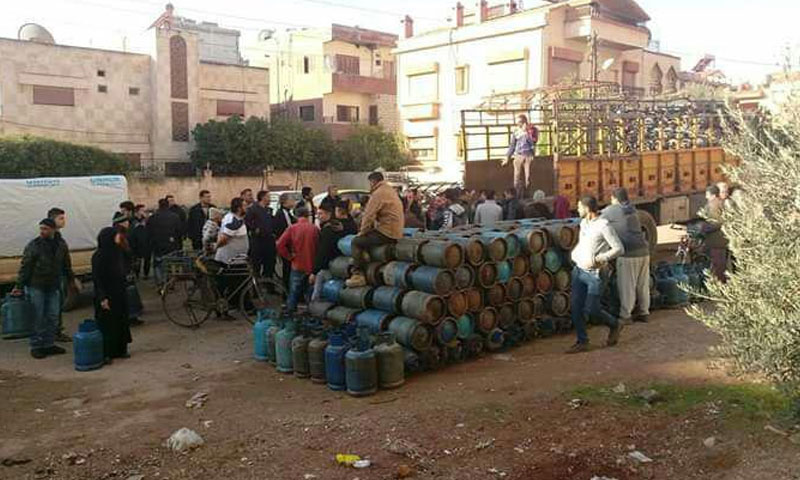An acute gas crisis is taking place in Daraa, amid illegal black-market monopolies and conflicting statements by the government about the availability of gas. As a result, the residents of Daraa turned to alternative methods such as electric power and firewood.
Each family’s share of gas is supposed to be one cylinder allocated through the smart card system every 23 days. However, gas distribution has been suspended for about three months under the pretext of re-setting the distribution and fighting the monopoly of the black market.
Enab Baladi tried to observe the impacts of gas crisis through interviews with citizens and boycotting government statements, in addition to shedding the light on the available alternatives.
Gas price triples
Enab Baladi learned from several citizens in Daraa that they are buying a gas cylinder at the price of 12 thousand Syrian pounds (SYP- around 13 USD) off the black market, that is three times the price that has been set during the summer, which was 4,000 SYP (4.3 USD).
Gas cylinders are available with hawkers at high prices, in which they try to avoid control and inspection campaigns, for gas cylinders are supposed to be sold at the official price of 2,400 SYP (2.6 USD); and the price of a cylinder should not exceed 3,200 SYP (3.6 USD).
The smart card system is a project implemented by the state Takamol company and initiated by the Ministry of Petroleum and Mineral Resources of the Syrian regime in order to distribute petroleum products among citizens. The government of the Syrian regime approved the distribution of gas cylinders through the smart card system this year.
Shortage of gas supply
Hassan al-Saeed, the director of the state Hydrocarbons Company in Daraa, told the state-run newspaper Tishreen on 12 December, that the cause of the crisis is the lack of liquefied gas in the province,
Al-Saeed explained that the number of smart cards in Daraa amounts to 213 thousand cards, and these cards require 276 thousand cylinders per month, at the rate of one cylinder per card every 23 days. However, last month only 100 thousand gas cylinders were provided.
Al-Saeed’s statements contradict statements made by Ahmad Hassoun, the director of gas operations in Syria. Hassoun told Melody FM, a local radio station, on 7 December that there is no shortage of gas, pointing out that the cause of the crisis is the growing demand for gas, especially with winter approaching. Hassoun also confirmed that the Hydrocarbon Company, which deals with the storage and distribution of petroleum products, will gradually increase its oil production.
What are the alternatives?
Daraa residents use methods to reduce or compensate for the shortage of gas especially for heating and cooking.
Among the alternatives that Enab Baladi has monitored for gas is the use of electric cooks, which are types of heaters designated for cooking during electric operating hours. This in turn caused an increase in electricity consumption and consequently led to the implementation of an electric power rationing program as well as frequent power cuts resulting from overloads.
Some residents resort to using cookstoves alimented by firewood, which is, indeed, an unhealthy option due to the toxic emissions and gases that they leave behind.

